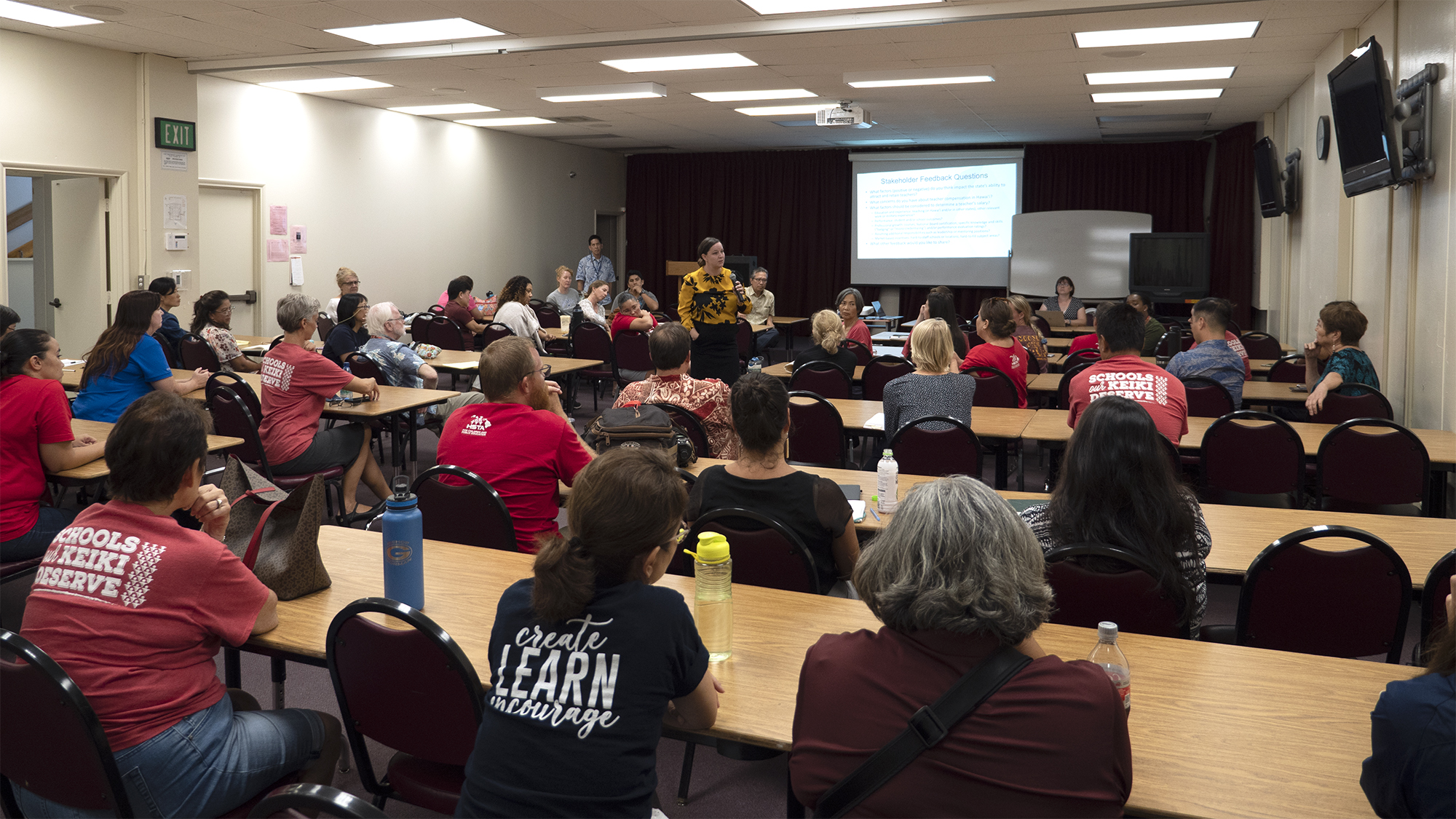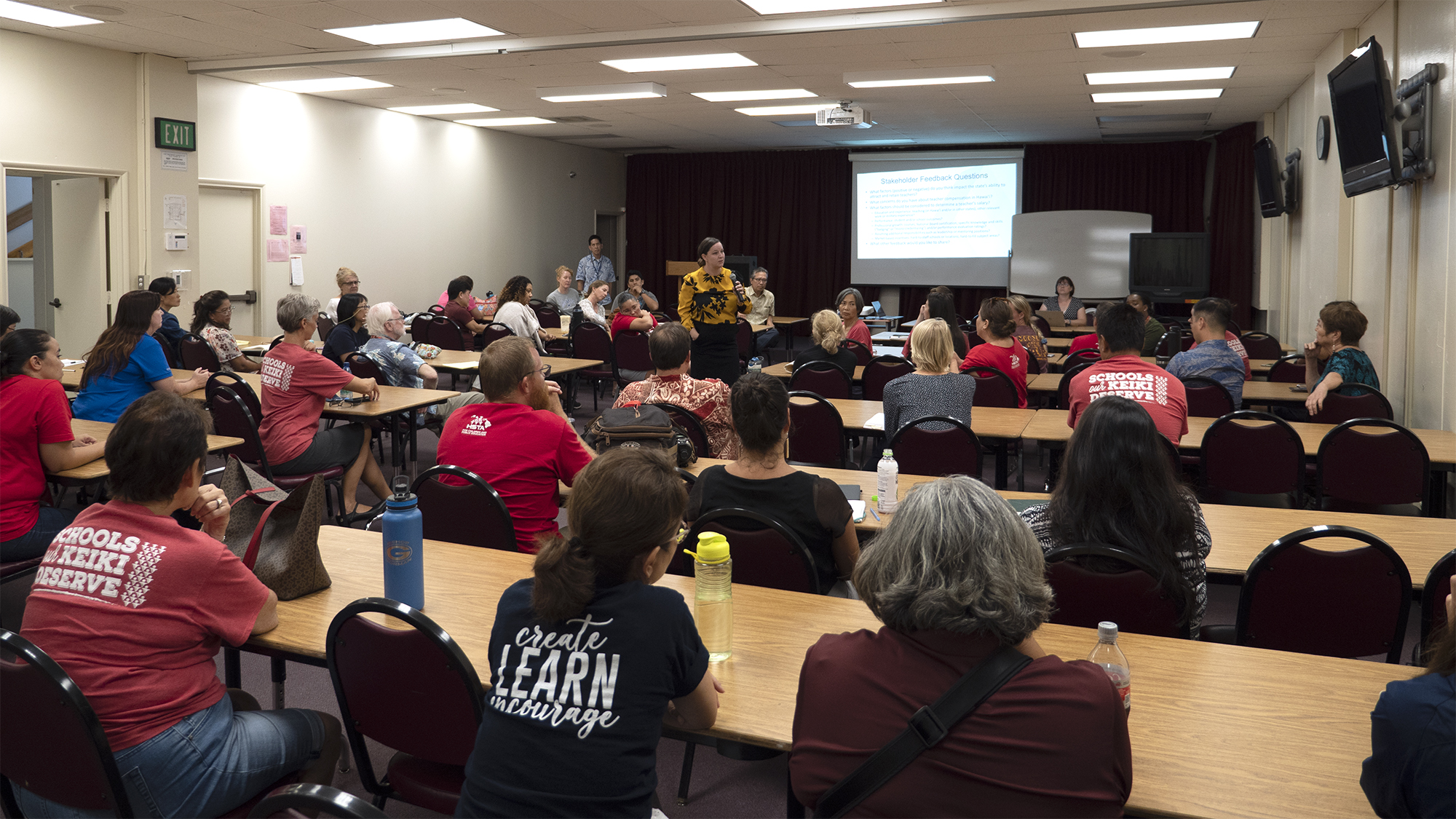
More than 70 people, most of them parents and educators, spent several hours Monday afternoon and evening talking about the need to raise public school teachers' pay in Hawaii.
It's part of a teacher pay study the Hawaii State Department of Education has hired a Denver-based consultant firm to conduct. The study will be completed at the end of the year.
During a listening session at McKinley Community School for Adults late Monday afternoon, Anjelica Ayers, a fourth-grade teacher at Queen Kaahumanu Elementary School, said, "I live paycheck to paycheck, even though I have a master’s degree in education. I’m working so hard for our students. Our responsibilities and our duties, every year, they add something, and we don’t get paid extra for it."
Ayers, who taught in Massachusetts before moving to Hawaii, said she could move back to Massachusetts and get a $12,000 raise immediately.
Parent group leaders: 'Our kids deserve better'
Lois Yamauchi, parent of two public school students and president of the group Parents for Public Schools of Hawaii said, "I’ve been very concerned about the low salaries of teachers in Hawaii, such that so many of our teachers have to work more than one job. They are professionals and they’re doing really hard work to teach our children.
"We have to look at ways to incentivize hard-to-staff subject areas as well as certain geographic areas," Yamauchi added.
More than half of Hawaii public school educators — 58 percent — have second jobs to make ends meet. A 2016 HSTA survey completed by 2,100 of its teacher members across the state found 33 percent earned extra income outside the teaching profession, and another 25 percent earned supplemental income on school-related activities, such as summer school, A+ after school care, tutoring, coaching, and so on.
That same survey found nearly 50 percent of those teachers who supplement their income spend seven or more hours a week at those jobs outside the classroom. That’s time that would be better spent preparing for their classroom lessons, working with students who need extra help, advising a student club, or just relaxing with their own families so they can be fresh and ready for their students in the classroom.
For those unable to attend a listening session, an online survey will be open from Sept. 23 through Oct. 6 to gather feedback. This survey will also be open to parents and community members.
Clare Hanusz, a board member of Parents for Public Schools of Hawaii, has a child in public school and one who just graduated.
"We expect so much out of teachers, and the compensation is nowhere near where it should be," Hansuz said. "Our kids deserve better than that, the teachers deserve better than that. They shouldn’t have to live with their parents and they shouldn’t have to live two or three people to a small apartment and be stressed out about their student debt."
Charter school leader says 'I went into administration because teacher pay sucked'
Ryan Mandado headed the special education department at Campbell High until he became chief academic officer at Dream House Ewa Beach, a new charter school that opened this school year. He told the hearing audience, "I went into administration because the teacher pay sucked.
"My first year teaching was a struggle. I worked three jobs trying to just get by," Mandado said, noting he lived with three other teachers, but still was living paycheck-to-paycheck.
"So many teachers are saying, 'How do I get into admin? How do I get into admin?' That should not be the case. Instead, it should be, 'How do I stay in the classroom?'" he said.
Mandado said special education teachers should get paid more.
"I ran the biggest special education department in the state (at Campbell High). The amount of work they put in was crazy. The amount of work they put in before and after school was overwhelming," Mandado added.
Jude Baliscan, an emergency hire special education teacher at Red Hill Elementary, explained he was paid more as a registered behavioral technician (RBT) last year working for a private contractor with SPED students in Hawaii for the last couple of years, compared to now, as a SPED teacher. As an RBT, he said he was paid $30 an hour, but now that he's a teacher helping to oversee RBTs, he's paid significantly less and may have to move back in with his parents.
Avi Penhollow, a teacher Kaiser High School and a 20-year teaching veteran, drives Uber to make ends meet.
“Everyone knows already, and it’s insulting to the intelligence of anyone who lives in Hawaii, teachers or not teachers, that no one’s making a livable wage,” Penhollow said.
“The priority has to be local teachers first and growing local teachers. There has to be an incentive,” he added. “People are incentivized to become administrators. People are leaving the classroom in droves to escape the classroom to gain a higher salary."
Teachers need routine step increases: ‘It should count for something that we stay here’
Farrington High School teacher Larry Wayman said, "When I entered teaching at Farrington, my pay was a little bit over $40,000 a year. I’ve been there 16 years and I just broke $50,000 this year. So the increase available to me has been pretty minor. I taught in California for a while, and there we move up by steps as we progress in our experience. And when I first came here, I assumed that the system was similar here, and I learned very quickly that wasn’t the case.”
Inga Park Okuna, a counselor at Kalihi Uka Elementary, said, “I’ve been in the DOE for 31 years and I’m still not at the top. And there’s a great discrepancy among those teachers who are somewhere near the middle, who came in and they kind of froze, and we lost the bottom so people came up, so we really have to fix that. There’s some real unfairness there.
“We need to get people at the top of the scale. It’s just not fair to have people near the bottom unless we bargain,” added Okuna, who works two jobs. “What is the incentive to stay if you don’t have hope that you’re going to get a step increase?”
“Once you’re here, the longer you work, the less you move,” said Lisa Morrison, a student activities coordinator at Maui Waena Intermediate, who has taught in Hawaii for seven years. “I have a friend who has 27 years of service in the DOE. She’s only three steps ahead of me on the pay scale, and that’s ridiculous. It should count for something that we stay here.”
For those unable to attend a listening session, an online survey will be open from Sept. 23 through Oct. 6 to gather feedback. This survey will also be open to parents and community members.
The listening sessions and subsequent analysis are being conducted by Denver-based education consultants Augenblick, Palaich and Associates, hired by the DOE on a $130,000 contract.
Two listening sessions will be held at the dates and times below in each location on Oahu, Maui and Hawaii Island. Following a short introduction, attendees were able to give feedback on how the state’s compensation system should be updated to best address the needs of students, educators, schools and districts. Some participants chose to introduce themselves by name and school where they teach, but others simply spoke without identifying themselves.
| Island | Date | Time | Location |
| Oahu | Tuesday, Sept. 24 | 4–5:30 p.m. 6–7:30 p.m. |
Kapolei High School (Cafeteria) |
| Maui | Wednesday, Sept. 25 | 4–5:30 p.m. 6–7:30 p.m. |
Baldwin High School (Auditorium) |
| Hawaii Island | Thursday, Sept. 26 | 4–5:30 p.m. 6–7:30 p.m. |
Keaau High School (Cafeteria) |
The Hawaii State Teachers Association (HSTA) represents 13,700 public and charter school teachers across the state who teach 180,000 students at 293 schools.

